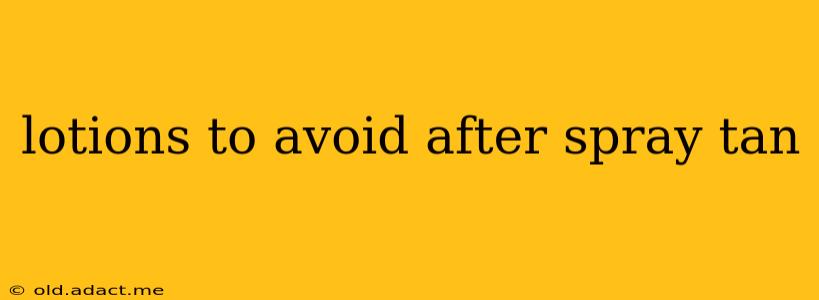Achieving that sun-kissed radiance with a professional spray tan is exciting! But maintaining that flawless finish requires careful attention to your skincare routine. Using the wrong lotions after your spray tan can lead to premature fading, uneven color, and even blotchiness. This guide will explore the types of lotions to avoid and offer tips for keeping your spray tan looking its best.
What Ingredients Should I Avoid in Lotion After a Spray Tan?
Many common lotion ingredients can wreak havoc on your freshly applied spray tan. The key is to avoid anything that might strip away the DHA (dihydroxyacetone), the active ingredient responsible for the tanning effect. Here are some key culprits:
-
Alcohol-based lotions: Alcohol is incredibly drying and can quickly lift the tan, resulting in uneven patches and premature fading. Look for lotions that are alcohol-free.
-
Exfoliants: Products containing AHAs (alpha-hydroxy acids) like glycolic acid or BHAs (beta-hydroxy acids) like salicylic acid are designed to exfoliate dead skin cells. While beneficial for general skincare, they will actively remove the tan along with the dead skin cells, making your spray tan disappear much faster.
-
Oil-based lotions: While moisturizing, oil-based lotions can sometimes interfere with the DHA's development and can cause the tan to appear uneven or blotchy. Many people find that oil-based products simply don't allow the DHA to set evenly.
-
Fragranced lotions: While a pleasant smell is appealing, strong fragrances can contain irritating chemicals that can cause your skin to react and potentially disrupt the tan. Opt for fragrance-free lotions to play it safe.
-
Retinoids: These powerful skincare ingredients are known for their anti-aging properties, but they are also potent exfoliants that will shorten the lifespan of your spray tan.
What Happens if I Use the Wrong Lotion After a Spray Tan?
Using the wrong lotion after your spray tan can lead to several undesirable outcomes:
-
Uneven fading: The tan may fade unevenly, leaving some areas darker than others. This is especially common when using alcohol-based or exfoliating products.
-
Premature fading: Your spray tan may fade far more quickly than expected, requiring you to get another spray tan sooner than anticipated.
-
Blotchiness: The tan may become blotchy or streaky due to the removal of the DHA in some areas.
What Kind of Lotion Should I Use After a Spray Tan?
To keep your spray tan looking its best, choose lotions that are:
-
Moisturizing: Hydrated skin helps to prolong the life of your tan. Look for lotions rich in humectants like hyaluronic acid or emollients like shea butter or glycerin.
-
Alcohol-free: This is crucial to prevent premature fading and unevenness.
-
Fragrance-free: This helps prevent irritation and potential reactions.
-
Oil-free (or lightly oil-based): Many people find oil-free best; however, some lightly oil-based lotions are acceptable as long as they are specifically designed for sensitive skin or use of after a spray tan. Always check the product description.
-
Gentle: Opt for a lotion specifically formulated for sensitive skin to minimize any risk of irritation.
Are there specific lotions recommended after a spray tan?
There isn't a single, universally recommended lotion brand. The best approach is to choose a fragrance-free, alcohol-free, and hydrating lotion suitable for sensitive skin. Read the labels carefully and prioritize the ingredients listed above.
Can I use body wash after a spray tan?
Yes, but choose a gentle, fragrance-free, and moisturizing body wash. Avoid harsh scrubs or exfoliating body washes. Pat your skin dry instead of rubbing vigorously.
How long should I wait to moisturize after a spray tan?
Most professionals recommend waiting at least 4-6 hours after your spray tan before applying any lotion to allow the DHA to fully develop and set.
By following these guidelines and choosing the right lotions, you can help extend the life of your spray tan and maintain that gorgeous, sun-kissed glow for longer. Remember, always check with your spray tanning technician for specific recommendations based on the products they use.
